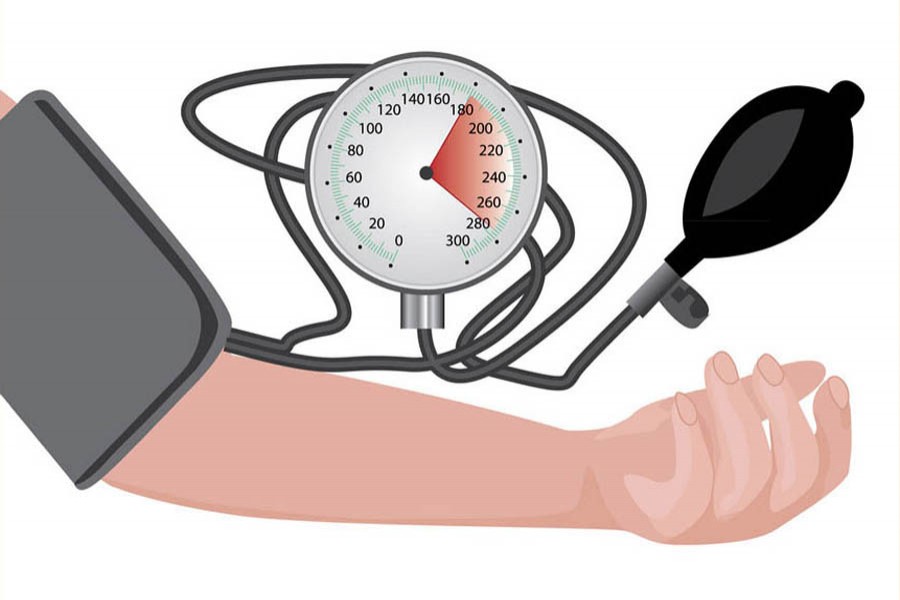
Published :
Updated :

Per-participant and per-capita costs of a hypertension patient in rural area are $10.65 and $0.63 respectively in the first year in Bangladesh, a recent cost-effectiveness study showed.
The cost is $10.25 and $0.29 for Pakistan, and $6.42 and $1.03 for Sri Lanka.
The costs were less for the next two years in Bangladesh and Pakistan but increased slightly in Sri Lanka.
Due to the relatively low costs of the trial, the scientists estimate that scaling it up to country level would cost each government less than $10.70 per participant treated in the first year.
Costs in subsequent years would decrease as only refresher training will be required.
The study conducted by Duke-NUS Medical School researchers and colleagues shows that a hypertension prevention and management trial could be cost-effectively scaled up for rural communities in low- and middle-income countries.
The findings were published in The Lancet Global Health. The study was released in Bangladesh on Monday from Singapore.
The study analysed the budget impact and cost-effectiveness of the Control of Blood Pressure and Risk Attenuation - Bangladesh, Pakistan, Sri Lanka (COBRA-BPS) trial, which was implemented between 2016 and 2019 in 30 rural communities.
Health workers who normally conduct maternal and childcare visits were tapped to provide door-to-door blood pressure monitoring and lifestyle coaching.
People needing professional care were referred to a general practitioner. Travel and additional medication cost subsidies were provided to people with low incomes and poorly controlled hypertension.
In Bangladesh, the trial was implemented by icddr,b in Munshiganj and Tangail districts among 895 hypertensive individuals in close collaborations with the NCD Control Programme, DGHS, MoHFW.
In the COBRA intervention areas, six Health Assistants (HAs) measured the blood pressure of 447 study patients at homes using a digital blood pressure machine and provided education for the promotion of a lifestyle.
The HAs referred patients with uncontrolled blood pressure to selected sub-district hospitals where doctors treated those patients following a treatment protocol and mobilised supplies of anti-hypertensive drugs for the patients.
"Cost-effectiveness studies are important for understanding the value-for-money spent on an intervention, while budget impact analyses indicate its affordability," said Professor Tazeen Jafar, from Duke-NUS' Health Services and Systems Research (HSSR) Programme, who spearheaded the study in all three countries.
"These indicators are important for health planners when they have to choose from a variety of interventions for a number of conditions," she said.
Prof Jafar and her team calculated the trial's total costs over each of the three years. Based on this, they calculated how much the trial cost per participant treated and per each member of each country's general population (per-capita).
Finally, they calculated how much it would cost to scale up the programme country-wide, and how much would be saved by catching and managing blood pressure early on.
"The government of Bangladesh is committed to expand health services for noncommunicable diseases countrywide. I am very pleased to learn that Non-Communicable Disease Control Program of DGHS support to icddr,b research has proven COBRA- BPS program would be effective for hypertension control in the rural communities," said Professor Dr Robed Amin, Line Director, NCDC, at the Directorate General of Health Services.
"I believe scaling up this programme at the national level would help doctors avert complications due to hypertension and also cardiovascular complication due to COVID-19 during the pandemic," he said.
"Uncontrolled blood pressure is a major risk of heart attack, stroke, and kidney failure in Bangladesh, and treating such chronic conditions is expensive. COBRA- BPS intervention is a clear solution for controlling blood pressure at low cost that can be easily scaled up in Bangladesh," said Dr Aliya Naheed, who heads the Initiative for Non-communicable Disease, Health Systems, and Population Studies Division at the International Centre for Diarrhoeal Disease Research, Bangladesh (icddr,b) and the principal investigator of the COBRA-BPS in Bangladesh.
"Studies have shown that reducing BP also reduces the risk of developing coronary heart disease, stroke and cardiovascular diseases (CVD), thus offering the potential for low-cost interventions targeting BP and other CVD risk factors to be both cost-effective and scalable," explained Professor Eric Finkelstein, also from Duke-NUS' HSSR Programme, and a co-senior author of the study.
The team is currently discussing how to facilitate scaling up the programme in Bangladesh, Pakistan, and Sri Lanka with authorities in provincial health departments.
The researchers anticipate that the results can also guide trials in other South Asian countries and are looking forward to expand the programme throughout the region.


 For all latest news, follow The Financial Express Google News channel.
For all latest news, follow The Financial Express Google News channel.